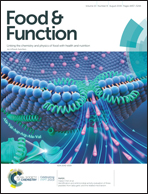A novel polysaccharide obtained from Craterellus cornucopioides enhances immunomodulatory activity in immunosuppressive mice models via regulation of the TLR4-NF-κB pathway†
Abstract
The immunoregulatory effect of a novel Craterellus cornucopioides polysaccharide (CCP) with a triple-helix structure on immunosuppressive BALB/c mice models was investigated; moreover, the immune response of BALB/c mice models in the preventive and therapeutic treatment groups treated with CCP was explored, and its molecular mechanism was elucidated. It was found that the BALB/c mice models in the preventive groups treated with CCP (120 and 240 mg kg−1 d−1) had better immunoregulatory activity. The spleen and thymus weight indices of the BALB/c mice models were significantly increased, and the histopathological analysis indicated a protective function of CCP against the immunosuppression induced by cyclophosphamide (CTX). Moreover, CCP displayed definite and clear synergistic effects on the T- or B-lymphocyte proliferation induced by ConA or LPS, respectively, promoted the natural killer (NK) cell activity and significantly increased phagocytic activity to activate peritoneal macrophages in immunosuppressive mice. The western blot and quantitative real-time polymerase chain reaction (qRT-PCR) results provided comprehensive evidence that CCP could upregulate the protein expression of the G-protein-coupled cell membrane receptor TLR4 and the production of its downstream protein kinases (TRAF6, TK1, p-IKKα/β and NF-κB p50); this, in turn, enhanced the production of cytokines (IL-2, IL-6, TNF-α and IFN-α) through both preventive and therapeutic treatments via regulation of the TLR4-NFκB pathway in the peritoneal macrophage of immunosuppressive mice.



 Please wait while we load your content...
Please wait while we load your content...